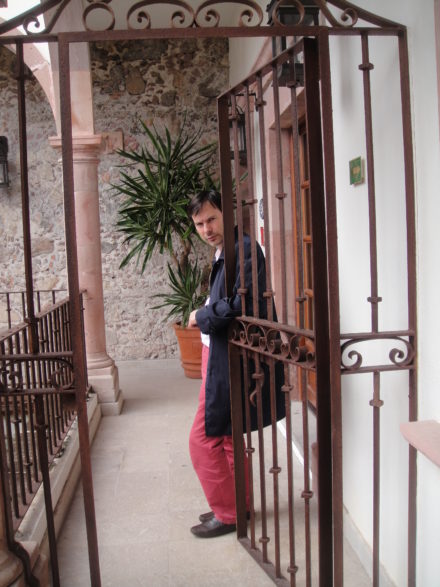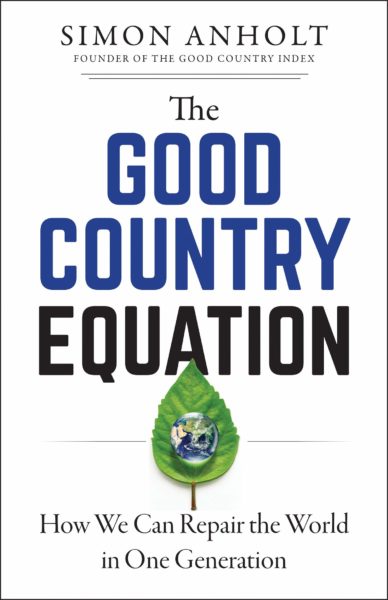
12. ON GOOD COUNTRIES
Direct download of mp3.
Simple Transistor landing page.
Transcript.
Sound: Podcast opens with recording of Orang Asli in Malaysia playing a nose flute (courtesy of Siti Kasim.)
Voice intro: Welcome to Nordic By Nature, a podcast on ecology today inspired by the Norwegian Philosopher Arne Naess, who coined the term Deep Ecology.
In this episode ON GOOD COUNTRIES, you will hear from Simon Anholt, an internationally renowned policy advisor who has helped over 50 nations use the Good Country Equation for education and development.
Over the course of his long and colourful career, Simon’s ultimate aim was to help increase the type of international cooperation that can solve the challenges of globalisation; from climate change, pandemics, and extremism, to slavery, war, poverty and inequality.
His core message to world leaders is simple; do good and good will come to you; change the way nations behave because our survival depends on it.
Simon’s latest book, The Good Country Equation: How We Can Repair the World in One Generation is full of amusing and sometimes surreal anecdotes from his years of travelling the far-flung places of the word.

Opening ceremony of the Commonwealth Heads of Government Summit in Valletta, Malta.
Sound: Ambient sound/music intro fades to Skype ringing
Simon Anholt Voice:
Hi, my name is Simon Anholt.
I’m in my study at home and I’m in the middle of the countryside, so out of the windows I can see nothing but trees at the moment, which is really nice….just kind of quite far away from anybody else, which is very nice.
And what am I? Well, I normally call myself a policy adviser because my day job is advising governments on policy.
A policy is one of those words that can mean all kinds of stuff. Basically, what I do is I advise governments on how they should behave and particularly towards other governments and the people of other countries and the international institutions.
So, I’m not really very interested in what governments ‘say.’ I’m not interested in messaging. I think that’s all a bit boring and shallow.
What I’m interested in is what countries do- and what governments do. So, when I call myself a policy adviser, I suppose that’s what I mean. I advise them on how to behave.
Asking the right questions
If I if I had a euro every time a government has come to me with a question that turns out to be the wrong question, I would probably have about 39 euros by now.
The countries are very difficult, very complicated things, and it’s very hard even for the people who are running them to know what the main issues are. And it has happened so often to me during my career that governments have come to me thinking they’ve got one kind of problem and it turns out they’ve got another.
Researching a country as an outsider
The first thing I like to do when.. when… I’m working with a country is to try to get to know it as well as I can. I mean, it’s very obvious that as an outsider, I’m never going to be nearly as much of an expert about the country. I’m advising as its own citizens, not if I live there, even for the rest of my life. But then again, that’s not what I claim to be. I don’t claim to be an expert in their country.
What I do claim to be as an expert on the rest of the world in a very general sense. But even so, I do need to try and become as much of an expert as possible, so, I read mainly, and particularly in these days, when travelling is so difficult, reading is even more important, so, I try to read as many books as I possibly can. I normally spend about four or five weeks at the beginning just reading; novels and history books and portraits of the country and listening to music and reading poetry and literature and watching the movies.
And then when I actually go to the country, I spend weeks and weeks going around just meeting as many different people of different sorts and different parts of the country as I possibly can. And gradually a picture begins to build up and it can only ever be a superficial one, but it’s of some value.

EAIE Helsinki Keynote talk, September 2019.
The book; The Good Country Equation
Well, I wrote the good country equation because I had to. Otherwise I would have burst. I’ve spent the last 20 or probably more than 20 years going around working with governments and often with presidents and prime ministers and kings and queens in 56 or 57 countries around the world.
And I don’t know whether it’s me or whether it’s just something to do with the job. But every country I go to, something extraordinary always happens. I always have some weird conversation or some weird experience, and it’s happy or funny or dangerous or exciting or potentially life threatening. And for years and years I’ve been doing this job and I come back and everybody I know says, you know, you should really write a book about all this stuff. Nobody will believe a word of it, but you still got to do it. And so eventually, after about 20 years, I thought, I will write this book.
But I wanted to make it primarily autobiographical, not because I want to see myself as the hero or anything like that, but just because I wanted it to be readable. See, I’m very interested in the state of the world and what’s gone wrong with the world, as many of us are.
Everybody in the world should be interested in what’s gone wrong with the world and trying to find out whatever they can about it. So, I thought what I’ll do is I’ll make this a tragic and comical autobiographical travelogue and I’ll write it in colour, if you know what I mean. So, it won’t be a black and white textbook. It’ll be a colour book with stories and places and people and anecdotes and funny things and sad things and frightening things and inspiring things. And then I’ll weave into that the story of how I gradually, country after country after country, began to figure out what really has gone wrong with the world. And then I can start weaving in what I think we ought to do in order to fix it.
As a child….
Now, I don’t know what it is about me, but when I was a kid and I was growing up, I just always assumed that people from other countries were going to be more interesting than people from my own country. And I always assumed also that other people’s countries were going to be more exciting and more beautiful and more interesting than my own country. And I thought this was normal. And gradually, as I grew up, I discovered that it wasn’t normal. And in fact, the older I got, the more uncommon I found it to be. And I’ve discovered that actually an awful lot of people think that people from other countries are going to be less interesting than people from their own country and that other people’s countries are going to be less interesting than their own country. And I don’t judge them in any way because of that. But I realize that we are different. So at the very heart of the book, there is this assumption that being a human being is more interesting than being a Swede or a Brit or a Guatemalan or a Kenyan.
And that the most interesting thing about us is certainly not the fact that we have a passport from a particular country, but that we belong to this extraordinary, remarkable, infuriating species called humanity.
My world view is in many ways a really simple one, in fact, simplicity is a good place to start, because one of the things I say very early on in the book is that over the years I’ve come to revere simplicity. And I don’t mean the kind of simplicity that comes from only seeing the surface of things, which is very, very common these days. What I’m always aiming for is the simplicity that comes from seeing through the surface of things because the surface seems so complicated. But the basic truths underneath are really often very simple and so many of the complex issues that we’re facing today as an international community, Present themselves in a way which is terrifyingly complex, but actually underneath we’ve got to hold onto those simple truths and those simple values.
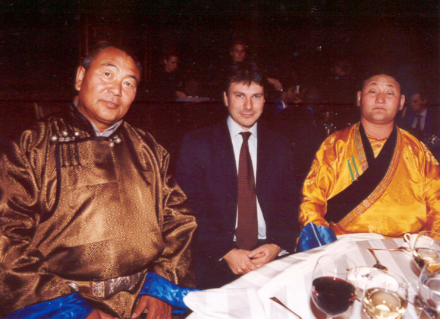
With government officials in Ulaanbaatar, Mongolia.
Two ‘simple’ underlying issues
So, what’s wrong with the world? Well, a Good Country Equation. I said it was simple. There are two things wrong with the world. The first one is the way that countries behave, and the second one is the way that people behave. And that may seem absurdly simple, but it is worth stating it. What’s wrong with countries is that they don’t work together enough to resolve the gigantic global challenges that humanity is facing in the 21st century.
You take all of these big challenges, what the United Nations calls the Sustainable Development Goals are attached to these. So, climate change, migration, human rights abuses, conflict, everything from narco trafficking and small arms proliferation right the way up to pandemics. All of these challenges have got one thing in common. They were all caused by human beings. And therefore, they can all be fixed by human beings.
The other thing that they all have in common is that they’re all globalized, they don’t exist in just one country, they are connected through globalization to every country in the world.
And that’s why it’s impossible for any individual country to solve any of them. America can’t fix the economic turmoil. China can’t fix migration. The European Union can’t fix climate change because these issues are too big and too connected. And so it’s not that we don’t know the answers, the solutions to these problems. We do. We know the solutions to all of these problems. We’ve known them for years. But the reason why we don’t implement those solutions is because countries don’t work together to do it. And so we never bring enough resources to bear towards tackling those problems. So when I say that one of the problems in the world is the fact that countries don’t work together, it’s literally just that they don’t work together frequently or thoroughly or sincerely enough to make proper progress against the vast majority of these global challenges. So, we need to change the culture of governance worldwide from one that’s fundamentally competitive to one that’s fundamentally collaborative. And I guess that’s the main theme of the book.
Sound: Mindfulness bell
The role of corporations
I’m really interested in corporations and their role in this debate. It’s certainly true and I do say so in the book, that corporations influence, or perhaps I should say govern the lives of just as many people or nearly as many people as governments do. And we most of us spend most of our working lives in association with corporations.
So the power and the influence they have over human behaviour is in our modern age, almost as much as the power exercised by governments, and the corporations themselves, of course, many of them are bigger than countries, many of them are richer than countries. Many of them are more powerful than countries. So I think that’s probably where the good country argument goes next. What is a good company?
And I know we will talk about the Good Country Index later on, but the idea of a good company index has been up there in my wish list of things I wish I could do if there were only a few more hours in the day- Religions, of course, influence the lives and the values and the behaviours of just as many people as corporations and governments.
I’ve talked mainly about nations because I think they’re the problem, and I have a bit of an issue with the whole idea of nation and nationalism, as many of us do. And again, what I didn’t really have time to do, either in the book or in my career so far, is to start drilling down to the level of smaller communities which are critically important and for very good reasons, more important to people than their nations. I find it easier to feel loyalty towards the village I live in than towards the United Kingdom of Great Britain and Northern Ireland, which is just a construct like most nations.
Outward versus inward mentality.
One of the most dangerous ideas in the world at the moment is that there are two species of person, the globalists and the localists. And this is a dangerous idea because with it comes the idea that we should hate each other and that we should mistrust each other and spend all of our time screaming abuse at each other. And this is daft because all human beings, as far as I can tell, are to some degree localists and to some degree globalists. It’s just a question of which degree we’re all both most of the time. And of course, we have to work together.
I mean, I’m I happen to be so busy thinking about global stuff that I don’t spend nearly as much time as I ought to worrying about the problems of the little village I live in.
It’s obvious that we should be collaborating in the same way that young people and adults should be collaborating, in the same way that people from different nationalities should be collaborating. It’s so blindingly obvious.
Yes, I mean, there’s no question that a national image is, for most people, a seamless extension of their self-image. And even if you don’t regard yourself as particularly nationalistic or patriotic or proud or whatever, there is a space in your heart for the thing that is your country and that you’re born in and so we humans have spent so much time and effort and worry over the centuries trying to forcibly instil this idea of national belonging and national identity.
I think we’ve forgotten the original purpose of it. The original purpose of it was to fight wars, and it was instilled in people very, very deeply. The idea that the noblest thing that a young man could do was to sacrifice his life for the fatherland, which is such an obviously ridiculous idea. And that’s why it took so long and so much effort to brainwash people into believing it.
And of course, in order to make it work, they had to brainwash all the women, the mothers and the sisters and the daughters. Also to encourage these young men, I mean, to tell a young man to go himself, get a gun and get himself blown to bits is not so very difficult because young men kind of want that to try and persuade all those much more sensible women to persuade them of the same thing was an altogether harder task. But it’s worked. And nowadays that is very, very deeply ingrained.
I think this is ultimately about human development. When a baby is born, it only really feels loyalty to itself and its need to survive and its mother. And then gradually, that sense of loyalty will extend to the father, if he’s lucky, and to the immediate family and then maybe to the village and then on and on and on. It goes to the nation state where it stops and that’s where it gets stuck. And feeling loyalty to anything bigger than the nation state seems to be a problem for the vast majority of us. And I think that human development has got stuck at the nation state.
I mean, don’t get me wrong, I don’t think there’s anything wrong with loving your country. I think that’s in many ways quite natural. But loving your country, not loving your nation, to love your nation is to love its army or to love its president. And very often goes with the idea that other people’s nations are inferior or don’t quite deserve to occupy their space on the surface of the planet as much as yours does. And that’s when it starts becoming problematic.
Understanding that we all belong
I think it’s absolutely true that the sense of belonging to a nation is fundamentally a very different thing from a sense of belonging to a smaller place, like a like a village or a town or even a city state, for the simple reason that a nation state isn’t actually a thing that exists in the real world. It’s an intellectual construct.
And so us feeling right, this this feeling that we belong to an intellectual construct is part of the modern mindset that detaches us ever more from the reality of nature. I can still remember, and I describe it in the book, the very first time I went up in a plane and I was a geography nerd, I used to read Atlas in bed. And when I looked out of the plane window for the first time and I couldn’t see those thick black lines on the ground dividing one country from another, I was really surprised and disappointed. But it reminds us that this thing called a nation of this thing called a country, it’s an invention. And if you identify yourself as belonging to an invention, then there’s something not quite right there.
Well, I hope that the first thing that people consider about me, if they consider me, is not my nationality, because, you know, like so many of us, I’m a terrific mongrel anyway. So many different races and religions and creeds and nationalities go inside the soup that makes me who I am. And so I find it very, very difficult to identify or associate with any particular country.
My country, the United Kingdom, where I was born, like most countries, has done an enormous amount of absolutely hellish things. And it’s done an enormous amount of really quite creditable things, as have most countries.
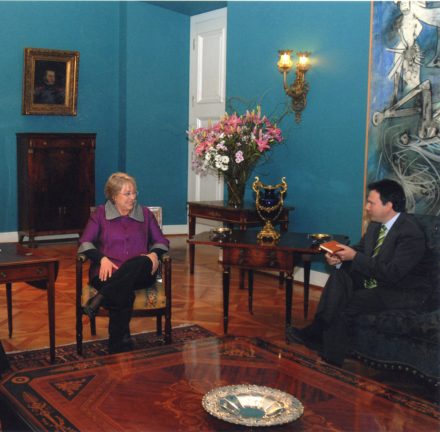
With Verónica Michelle Bachelet Jeria, a Chilean politician who served as President of Chile from 2006 to 2010 and again from 2014 to 2018.
What is a good country?
But the point that I really wanted to make was a slightly different one. People often are a little bit puzzled by this phrase. I keep using a good country and they mean, well, who? And they say, who are you to decide whether a country is good or bad? And the thing that I say is I’m trying to use the word ‘good’, not as the opposite of bad, but good, the opposite of selfish. And a good country is not in any sense a virtuous country. It’s a country very simply that succeeds in harmonizing its responsibilities towards its own people and its own territory, with its responsibilities towards other people and other territories.
And that’s the rule for life on earth in the 21st century. Countries and corporations and universities and villages and all groups of people need to harmonize their domestic and their international responsibilities so that everything they do for their own people and their own slice of territory. Does no harm or preferably even does good to people outside that territory and to places outside that territory.
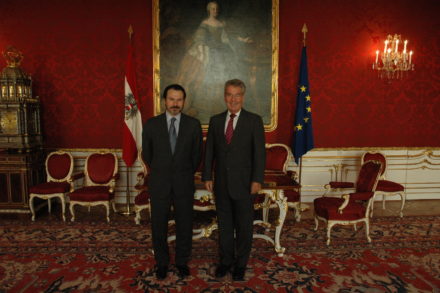
With President Heinz Fischer of Austria, who was was elected Federal President of Austria in April 2004, and re-elected for a second and final term in 2010.
The most common myth
So, one of the biggest challenges I’ve had during my career advising governments is to persuade prove to governments that it is actually possible to be a good country, to harmonize the inside and the outside responsibilities. Because the interesting thing about all of these politicians I’ve worked with is that it doesn’t actually make any difference which party they come from, whether they’re left wing or right wing or turbo jet propulsion unit. I really don’t know that it makes any difference at all where they come from. They all believe the same thing, which is that anything you do that’s good for your own people is going to harm people in other countries. And anything you do that’s good for the planet and the environment is somehow going to curtail your economic growth or harm your own people or harm your own territory. And this seems to be an article of faith that all politicians have absorbed. And it’s absolutely not true.
One of the really lucky things for me about doing the job that I do and working with so many different countries is that I’ve had the opportunity over the years to try out real policies in real countries to see whether it’s possible to harmonize the domestic and international responsibilities. And what I’ve discovered is that not only is it possible, it also makes better policies, it makes more imaginative thinking and imaginative thinking is what we desperately need in the 21st century.
Not only is it possible to do the right thing for your own people and for people in other countries, it actually means that you’ll end up doing better and more interesting things. And somehow we need to get the word out to the politicians that this is possible.
Sound: Short mindfulness bell
Smart policy-making, beyond altruism
The thing that I’m really not talking about here is altruism or self-sacrifice. The idea that a country should sacrifice itself for other countries is a daft idea. No country could, would or should ever consider doing such a thing.
That’s going back to this ridiculous Victorian idea of charity, where it’s the it’s the obligation of the wealthy to help the poorer. Well, there’s some truth in that. But it’s not really the main point.
The main point is that we all occupy a space on this earth and therefore we all have an equal responsibility, whatever’s happened in the past to try and fix it as equals moving forward.
And so, when I say to a country, you need to be good, what I don’t mean is that you need to give away all your spare money to poor countries. What I mean is simply that it is in your interest to do this. And I suppose the core component, the surprising component of the Good Country Equation is this remarkable discovery that I made back in 2012, that it is actually directly economically in your interest as a country to assist and support the international community.
And the reason for that is because it’s a two-stage argument, first of all. The overall image, the good name of a country is the thing which more than anything else, drives its success economically. So the countries that have got good, powerful, positive reputations like Sweden, or Switzerland or Canada or whatever, they find it much easier to make money out of trade, tourism, foreign investment and everything else.
They have a much better relationship with the rest of the world and with consumers all around the world. They make more money because they’ve got a better image. The countries that have weak or negative images that nobody’s ever heard of or that associated with war or conflict or trouble of one kind or another, they find it much, much harder to grow economically. It’s harder for them to get trade. It’s harder for them to export their products. It’s harder for them to attract talent and investment and so on and so forth.
So, discovery number one, countries need good images in order to progress and prosper. Discovery, number two; the factor which more than any other determines whether a country has a good image or not is how much it helps the international community. It’s not how successful it is.
The reason why people admire Sweden or Norway, for example, is not because Sweden and Norway have successful social models. It’s because they believe that Norway and Sweden contribute to the world in which they themselves live.
If I live in in Paraguay, I don’t care whether people in Norway are happy because it doesn’t affect me. I don’t live there. I don’t care whether they have good welfare or good health care provisions because it doesn’t benefit me.
What I care about is are these countries making the world a better place for me and my children to live in? So, when I go to bed at night, I think positive thoughts about Norway and Sweden, because I think to myself, they at least I’m glad they’re there. They’re not disturbing the international order. There are other countries, on the other hand, that I worry about as I go to bed at night because they are disturbing the international order.
Well, that’s what I believe.
So discovery number two, if a country wants a good reputation, it has to be a good citizen. It has to contribute to the grand challenges in some way. It has to tackle visibly and effectively migration, poverty, inequality, pandemics, climate change and so on and so forth.
So this is a big discovery. This is a little bit like corporate social responsibility all over again. But at the level of the nation state, if you want to make more money as a country, you have to have a better image. And if you want a better image, you have to goddamn well behave yourself. And that is quite a surprising discovery.

Simon Anholt speaking at TEDx Amsterdam.
Why I wrote this book
I think this is probably the main reason why I only felt ready to write this book when I had some mechanisms for encouraging countries and governments and people to behave differently that weren’t an appeal to their values.
I hope people won’t think that I’m a cynic. But I think that expecting governments and corporations to change their behaviour on the basis that something is right or wrong is never going to be as successful as when you appeal to them on the basis of what they really care about.
If it’s a government, it’s on the principle of staying in power and pleasing your people. And so, in a completely non-cynical way, I don’t waste my time telling people not to do things because they’re morally wrong. Nor do I waste my time criticizing people for doing the right things for the wrong reasons.
I don’t care about their motivations. I’m too old for that. I just care about whether they’re doing the right thing. And so that’s why the good country equation seems to be ready for exposure, because it’s based on simple, enlightened self-interest.
I’m not lecturing anybody. I’m not saying you must do this because it’s the right thing to do, because racism is wrong, because colonialism is wrong and so on and so on and so on. Those conversations can and will and must continue, but they don’t generally cause people to change their position.
On the other hand, if you can give somebody a very clear explanation for why changing their position will produce a better result for them, that’s in line with what they’re trying to achieve, then you stand a much greater chance of producing change. I’m not a purist in that respect. And so the good country equation is an appeal, a simple, logical, clear appeal to the self-interest of governments and individuals.
Sound: Mindfulness bell
The ins and outs of evidence-based research
Since almost the very beginning of my career, I’ve liked all of the advice I give to countries to be evidence based.
That discovery that countries need good images and those images can only come from principled international behaviour mainly comes from analysis of a database of a survey called the Nation Brands Index, which are created back in 2005.
And this is just a big global annual poll which interviews 20,000 people around the world every year on their perceptions of 50 different countries. And by 2012, I discovered that it had accumulated over a billion data points. So, I took some time off to analyse that huge database because I wanted to ask one simple single question Why do people admire country more than country B?
I knew it wasn’t because country makes more noise about it. I knew it wasn’t because country does relentless propaganda campaigns telling everybody how wonderful it is, because it was obvious from the data that it was nothing to do with that. But by crunching this huge database, what I did discover was in fact that yes, the primary driver of a positive natural national reputation is good behaviour in the international community. And then I’ve used lots of other surveys of my own and other people’s surveys to corroborate that evidence over the years.

Simon in Helsinki.
That awful word: brand
There is always a risk that if a country has a very good image, then people are not interested in hearing about or learning about or recognizing some of the bad things it does. And in exactly the same way, there’s a risk that if a country has a very bad image or a very weak or negative one, people are not interested in learning about the good things that it does. And the reason for this is because we’re just short of time. Last time I checked, there were 205 countries on Earth. And if we if we worried about the reality of those countries and we spent our time looking into exactly why we think they’re good or why we think they’re bad and how much harm and how much good they’ve done, we’d have no time left to do anything else.
We wouldn’t be able to eat or sleep. And so, what we do is we make do with the kind of prejudice stereotype.
This is why I use the awful term brand. 20 years ago, when I first coined this awful term brand, I was actually being ironic. I was saying that countries in the age of globalization have turned into brands on a supermarket shelf and it’s as if we can only hold in our mind at any one time one simple single fact about a country and one simple single set of prejudices, either positive or negative.
And this is hugely problematic because countries, of course, are not simple. Countries are really complicated. And anything you can say about one country, the opposite is probably equally true in a different domain. So that was the reason, incidentally, why I was very keen to create the Good Country Index, which I launched in 2014. This is an attempt to make it a little bit easier for people to actually answer that question: Is this country generally doing more good or more harm to the planet and to humanity in general? To do a kind of balance sheet for every country that answers that question for you in so far as it’s possible to answer it?
Why a Good Country Index?
I remember the week I started work on the Good Country Index; David Cameron, who is the prime minister of the United Kingdom at the time, told us all on Monday that we should despise China because it was a serial abuser of human rights. And then on Friday, he told us that we should all love and admire and respect China because it was going to rescue the British nuclear industry.
And I found myself quite puzzled and I thought, well, this is supposed to be my trade and I’m puzzled. What must everybody else be thinking? And I realized actually I would like to know whether ‘Net-Net’ China is a contributor to humanity or whether it’s a free rider on the international system and America and the United Kingdom and all these other countries as well. So that’s where The Good Country Index came from.
The way that it works is in principle, very simple. There are just 35 big data sets that mostly come from the United Nations and a few other international organizations that the organizations that are capable of collecting robust and reliable data about, you know, 100 plus countries every year.
And basically, I look at all the data that gives you some measurement about positive or negative impact of that country outside its own borders. So, for example, I’m not interested in Sweden’s health care provision because that only affects its own citizens.
And if you want to find out how Sweden treats its own citizens, there are a dozen indexes out there that will tell you that. But I want to know whether I as a Brit, should feel glad that Sweden exists. Is it making the world a better place for me, not for not just for Swedes?
And so you can look through The Good Country Index and you can see the positive and you can see the negative. So you can see that, for example, yes, Sweden, like most rich countries, gives away quite a lot of spare cash to poor countries every year. And that’s generally a good thing. I don’t think it’s possibly the best thing it could do, but it’s a good thing. And there is it’s high mark on overseas development assistance. On the other hand, I can also see that it’s very near the bottom of the list when it comes to weapons exports.
Now, call me old fashioned, but I happen to think that selling guns is wrong because it results in people being killed. And by the way, you can also see how many people Sweden was responsible for killing outside its own borders; not very many.
And so across these 35 data sets, you can see all the measured and measurable contributions, positive or negative, that one hundred and sixty odd countries make to the world outside their borders. And it adds them up for you and it gives you a total. Whether you agree with that total or not is entirely a matter of personal opinion. But at least it’s trying to break down some of this enormous complexity and give you an answer to that question. Am I right to admire Sweden? And if so, in which areas and in which areas is Sweden not admirable? And is there something that I should do about it?
The framework of The Good Country Equation
There are 35 individual indicators that make up the overall ranking of the Good Country Index, and this sorted into seven categories. So, each country is evaluated according to its global contribution to science and technology, its global contribution to culture, its global contribution to international peace and security, its contribution to world order, its contribution to planet and climate, its contribution to prosperity and equality, and finally to health and well-being. And then within each of those seven categories, there are five data sets making a total of 35. Now, the interesting thing is that I didn’t actually start with the framework. I ended with the framework.
Where I started with was a search for data sets. So my colleague Robert Gervaise and I spent a long time just basically trying to find any good, reliable, annual robust data sets that measured the external impacts of the behaviours of at least 160 or 150 countries. And we managed to find 35. That’s all there are.
So we’ve basically ended up with these 35 data sets, some of them are negative, like how many people have you killed outside your own borders? Some of the positive, like how many scientific journals have you exported contributing to global science and technology and so on and so forth. And and then they make an overall ranking. Well, they make seven rankings, one for each category and an overall ranking for the for the good country index. And that’s basically the way that it works.
The good country index is updated every year. The I’m currently working on the latest edition and hope it’s going to be out in the next week or two.
The thing that people need to understand about the Good Country Index is that these data sets produced by the UN and other big international bodies, they tend to be about three or four years behind the times because they’re only published once they’ve been checked.
And if you’re talking about millions and millions and millions of data points, that takes a long time.
United States of change
So, for example, the picture in the latest edition of the Good Country Index, one point three, we call it, shows that the United States of America is at overall ranking 40.
So relative to the size of its economy, it’s the fortieth country in the world in terms of the good that it does to humanity on the planet outside its own borders.
Incidentally, it’s a very, very close ties with Russia, which comes 41st.
The interesting thing is that not only The Good Country Index, but also the Nation Brands Index, which measures international perceptions of the country, have both been plummeting ever since Trump took office.
The United States is now the seventh most admired country on the planet, according to the Nation Brands Index, which is the same place it was in the second term of George W. Bush.
America is normally the most admired country on the planet. That’s its natural position still. But every time they have an internationally unpopular president, which happens from time to time, it tends to drop down to sixth or seventh.

051207 Dalarna hörsalen Teknikdalen, Foto Henrik Hansson.
Inserted: A tool for reflection and a work in progress
Well, the good country index is very much a work in progress, it cannot and does not claim to present a full account of what countries contribute to the rest of the world. It just needed to be done.
So unless you’ve got data, you can’t really include it. You know, they’re hard to measure, but it’s a step in the right direction. It’s shining a small torch in the corner of a very, very large, very dark field. And what I’ve always hoped when I release indicators like this is that people will take that as a cue to contribute, to make it better collectively rather than a cue to just say this isn’t complete. I know it’s not complete.
On environmental data
In terms of the environmental data here, we’re still in the Middle Ages, frankly, when it comes to measuring ecological performance, if that’s the right word for it.
First of all, I use the ecological footprint created by the Global Footprint Network. And that’s quite a sophisticated piece of work and is good because it gives a kind of overall element into the countries score because we’re very interested in the policy side.
This is governments as much as countries that we’re talking about. We also include as a factor the degree of compliance that each government has with the major environmental agreements. And then we include hazardous pesticides exports, not necessarily because that in itself is the most significant thing, but because it tends to correlate quite strongly with a lot of other environmental or non-environmental behaviours.
We look at the countries renewable energy share because that gives us a hint as to the level of investment that they’re putting in to being more planet friendly. And we look at emissions of ozone depleting substances, which is still an issue. And again, it’s an important indicator.
Other uses of The Good Country Index
There are a few countries now where they’re actually using The Good Country Index as a framework for questioning candidates in elections, which is a really, really interesting way of using it. That basically there’s a group in Australia, for example, who use the Good Country Index to quiz candidates who are standing for the next election.
And they say this is Australia’s profile at the moment. This is the good we do. This is the harm we do. What are you proposing to do about all of those? And the politicians are absolutely dumbfounded by this, mainly because elections are, generally speaking, a 100 percent domestic affair. Nobody ever talks about international relations during national elections, but that’s a whole other story.
From competition to collaboration
I said before, why it’s economically in the interest of countries to collaborate more with other countries. But it’s also valuable for them to do that for another reason. And that is because it creates better policy. And if you look at the amount of collaboration that governments typically engage in in their daily existence, it’s pathetically small. I mean, the Nordics are better than many. The Nordics are better than many in many respects because they have a long history of cooperation and collaboration, both within their subregion and within the European Union. So they know that it works.
Sound: Mindfulness bell
Entrepreneurial multilateralism
Yes, sure, sure, but I mean, there’s this this idea which I mentioned in the book, which I call ‘entrepreneurial multilateralism’, which is extremely difficult to say; it’s a terrible a terrible name, but the idea is basically that countries shouldn’t wait for the UN to tell them to work on things. They should get together in random, weird, collective, collaborative units and solve their own problems collectively.
So when I was advising President Koroma in Sierra Leone a few years ago, I said to him, you know, we’ve got this this huge challenge of poverty in Sierra Leone. And of course, it would be great to talk to some other countries and see if we can observe some best practice and see if we can do some multicultural brainstorming. But let’s not go to the traditional countries, you know, the donors that always help Sierra Leone or your regional neighbours or whatever it is, let’s do something a bit more random and see if we can generate some much more unpredictable and much more exciting and inspiring interactions. So let’s go as random as we possibly can. So Sierra Leone begins with the letters S.L. Why don’t we just team up with every other place we can think of? That also begins with S.L.
So obviously Sri Lanka, St. Louis, Missouri, South London and so on and so forth. And you end up with the most random group of places you can possibly imagine that have nothing in common.
This is what the great Edward de Bono called lateral thinking. The more you mess up the frameworks of your thinking, the better the solutions become. If you’ve got Sierra Leone having a conversation with Saint Lewis and how do they say that in America, St. Louis with St. Louis and South London, then you’ve never had that conversation before? Guaranteed.
And the mutualisation of experiences and the mingling of the gene pool and the stirring up of those races and religions and histories and experiences and mindsets and approaches is just going to make a much, much richer soup and better ideas.
And then the great thing is that if you come up with an idea for reducing poverty in Sierra Leone, it works for all of those places, then it can be implemented in all of those places. And you fixed five countries for the price of one.
I think that the foreign minister should be renamed global minister and her or his job shouldn’t be to keep foreigners out of the country.
It should be to throw open the windows on every single policy debate in the country, even if it’s absolutely domestic things. If I was a Swedish politician and I had to sort out nurses pay in in your body, then the way that I would try and do that would be I would get a couple of public health specialists from Guatemala City and a couple from South Korea and a couple from South Africa. And we’d all sit down and brainstorm.
I absolutely guarantee that we will come up with more better interesting ideas than if we just had a bunch of Swedes in the same room together. And the same is true for any nation.
Your culture determines the extent to which you are capable of creative thinking, and the more you stir it up, the better the results.
This is not political correctness. But he whole point about difference is that it’s the most productive thing in the human experience; this extraordinary resource for creative and imaginative thinking. If only we stir things up. I think the world’s national anthems should be Stir It Up by Bob Marley.
Tanya Outro
Sound: Tanya’s garden, summer sounds
Outro: Thank you for listening to this episode of Nordic By Nature, ON GOOD COUNTRIES. You can find more information about Simon Anholt on his website, Simon Anholt dot com, and a transcript of this podcast on imaginarylife.net/podcast.
Simon’s book, The Good Country Equation: How We Can Repair the World in One Generation is published in San Francisco by Barrett Curler and distributed internationally by Penguin Random House.
Please help us by sharing a link to this episode with the hashtag #tracesofnorth and follow us on Instagram @nordicbynaturepodcast. We are also fundraising for a second series of podcasts on panteon.com/nordicbynature.
The music was created by Diego Losa. You can find Diego on diegolosa.blogspot.com
If you would like to find out more about nature-centred mindfulness, please see the work of Ajay (ah-jay) Rastogi on foundnature.org. You can also follow the Foundation for the Contemplation of Nature on Facebook, and on Contemplation of Nature on Instagram.
We’d love to hear your thoughts on our podcast, so please email us on nordicbynature@gmail.com
END

